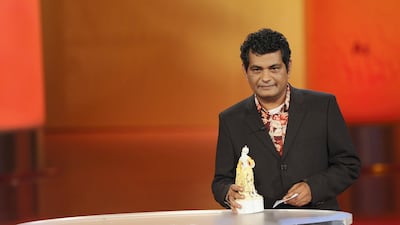Pakistani author Mohammed Hanif is considering the unique challenges of writing about his home country. In his two novels, A Case Of Exploding Mangoes and Our Lady Of Alice Bhatti, he found a sweet spot between the profound and the absurd. In his journalism – he has a column in the New York Times – he's not afraid to pierce the contradictions apparent in Pakistan.
“Sometimes people say I give Pakistan a bad name, and I always reply ‘hang on, this is what is happening around us,’” he says, almost indignantly. “So to say we can only talk about these things amongst ourselves is totally illogical.
"When you live and work in Karachi there are happy moments and there are bad moments. But that's not to say you don't laugh."
Which is a nice way to sum up Hanif's entire career. In the Booker-longlisted A Case Of Exploding Mangoes (2008), the real-life plane crash that killed Pakistan's military dictator Muhammad Zia-ul-Haq in 1988 is the basis for an enjoyably cynical political thriller full of wit and slapstick. And Our Lady Of Alice Bhatti has at its heart a love affair framed around a ridiculous three-day riot in Karachi's streets.
His new novel, Red Birds, due next year, promises "a dark comic absurdity of tone… telling deep and important truths about our crazy contemporary world." That line comes from his publisher, by the way – Hanif won't say anything about it other than it's set "in my head".
But as a novelist and working journalist, he's perfect person to discuss cultural heritage and the impact of current affairs on writing in a session at Sharjah Book Fair today with the IPAF-winning Saudi author Abdo Khan and British journalist and author Sarfraz Manzoor. "I don't consciously set out to explore a culture when I try to tell a story," he says. "But writers, like everyone else, are born into a culture, grow up in it and are shaped by it. There's no escaping where you're from, and though in writing you're creating a fictional world, reality always creeps into your work.
“The key then, for me, is to try to find a deeper meaning rather than the exact truth of a situation,” he says.
It's very much how Our Lady Of Alice Bhatti ends, the twist reframing everything we've once held to be true of our heroine. And there's a similar approach in his libretto for a new opera based on the life of Benazir Bhutto, created with composer Mohammed Fairouz. An ambitious undertaking – not just in terms of how it might go down in Pakistan – as Hanif admits he was new to the form.
"Mohammed Fairouz got in touch after reading my books," he says. "We'd discuss ideas and I decided to give it a go. So it was his idea, but I have always considered writing about the Bhutto story in the past – simply because it covers most of my grown-up life.
“It’s a steep learning curve, absolutely. But I think this is the perfect medium for the Bhutto story. It’s always seemed to me that whatever happened to that family was so over the top, on this grand scale. Huge passion, death after death after death – it’s the stuff of great opera.”
Perhaps because of his time as a pilot in the Pakistan air force or his fearless writing, Hanif has a slightly wry, devil-may-care attitude to life – there's plenty of laughter in our conversation from Berlin, where he's a fellow at the Wissenschaftskolleg. When I ask what his time there involves, he says with a chuckle: "Not much. I take some time off, come here and pursue my own personal project and get to hang out with other fellows."
And when I ask him why it's taken so long to write the follow-up to Our Lady Of Alice Bhatti, he's disarmingly honest. "I'm very lazy and slow. I kept starting and stopping. But finally it's finished now."
Of course, it's not as if Hanif has been sitting around. He regards himself as a working journalist and it seems like the concept of Red Birds may have kept him occupied, particularly when it seems to have such contemporary relevance.
“Sometimes, I think to myself, look, there are lots of good, nice, lovely people in the world, why don’t you concentrate on that?” he says. “So I try, and then on page five someone dies and I think, no, my beautiful world has come crashing down. It is difficult to escape from your reality.”
Mohammed Hanif is at the Book Forum, Sharjah Book Fair, today at 6pm.
_____________
Read more:
The Ministry of Utmost Happiness not for movie: Arundhati Roy
Book review: Han Kang’s The White Book is a novel of extraordinary stylistic purity
Philip Pullman’s extension to his magical world is well worth the wait
_____________

